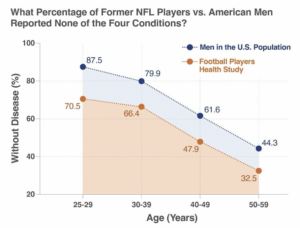Author: Rachel Grashow (rgrashow@hsph.harvard.edu)
Blog based on a recently published study.
Background
Anecdotally, former professional American-style football (ASF) players commonly report feeling older than their chronological age. At the same time, medical providers who treat former players have seen clinical signs of aging earlier than expected. To explore whether former players were aging faster than average American men, we compared the prevalence of four conditions associated with advanced age, as well as a measure of healthspan (defined as the duration of life without chronic disease).
Why is this study important?
Conditions associated with advanced age, such as diabetes, arthritis, dementia/Alzheimer’s Disease, and hypertension, can lead to negative health outcomes and poor quality of life. Prior to this study, relationships between age, healthspan, and chronic illness had not been rigorously examined among former ASF players. By highlighting the need to identify young and middle-aged players who may harbor conditions of interest, this study lays the groundwork for future interventions (pharmacological, procedural, and behavioral) that could lead to positive changes in both length and quality of life in former professional athletes.
How was the study conducted?
To address the question of whether football players are experiencing early aging and living with illness and disability for more years than non-football players, we examined the responses from former football players to a self-reported health and wellness questionnaire. Specifically, our researchers calculated estimates of prevalence for four diseases – arthritis, dementia/Alzheimer’s Disease, hypertension, and diabetes – in 2,864 former players under the age of 60. These estimates were compared to those derived from two surveys of general American men (U.S. National Health and Nutrition Examination Survey [NHANES] and U.S. National Health Interview Survey [NHIS]). We also calculated a prevalence measure of healthspan, defined as the absence of the four conditions of interest. All prevalence estimates were adjusted for race and body mass index (BMI).
What did the study find?
As expected, our research confirmed that hypertension, diabetes, arthritis, and dementia all increased with age in both football and general populations. However, the proportion of players who experienced these conditions was different from their non-football peers. For both arthritis and Alzheimer’s disease/dementia, we found an increase in self-reported diagnoses across all ages. For hypertension and diabetes, a higher proportion of former players reported these conditions in the youngest age group (25–29) only. As shown in Figure 1, our findings demonstrated that players, on average, had ten fewer years of healthspan, meaning they were without hypertension, arthritis, Alzheimer’s/dementia, and diabetes. This means that former players reported “loss of health” (reporting at least one of the four conditions of interest) appropriately ten years earlier than non-football American men. Among football players, linemen were more likely to report at least one of the conditions studied compared to non-linemen under the age of 50.

Figure 1. Race- and BMI-adjusted healthspan (defined as freedom from arthritis, dementia/Alzheimer’s Disease, hypertension and diabetes) compared for former professional ASF players compared to a population of American men.
What are the key take-home points?
These results highlight the opportunity for clinicians who treat former professional American-style football players to identify early adult and middle-aged players who may harbor cardiometabolic, orthopedic and neurocognitive diseases at ages younger than expected in the general population. When these diseases are discovered early, physicians are better equipped to prescribe pharmacological and behavioural interventions that may help extend health-span and improve quality of life for former professional athletes.